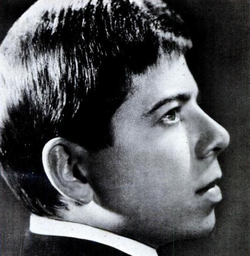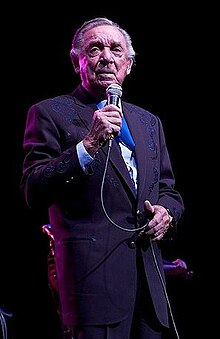Still a loved song over 40 years later with it's unforgettable orchestration and tragic lyrics.
Bobby Goldsboro (born January 18, 1941)[2] is an American country and pop singer-songwriter. H
He had a string of pop and country hits in the 1960s and 1970s, including his signature No. 1 hit "Honey," which sold over one million copies in the United States.
He had a string of pop and country hits in the 1960s and 1970s, including his signature No. 1 hit "Honey," which sold over one million copies in the United States.
| Bobby Goldsboro | |
|---|---|

Bobby Goldsboro in 1967
| |
| Background information | |
| Born | January 18, 1941 Marianna, Florida, United States[1] |
| Genres | Country, Adult Contemporary,Pop |
| Occupation(s) | Singer-songwriter, guitarist,painter, television producer |
| Years active | 1962–present[1] |
| Labels | United Artists, Curb[1] |
| Website | www.bobbygoldsboro.com |
| Bobby Goldsboro | |
|---|---|
| Born | January 18, 1941 Marianna, Florida, United States[1] |
| Genres | Country pop Adult Contemporary |
| Occupations | Singer-songwriter, guitarist, painter, television producer |
| Years active | 1962–present[1] |
| Labels | United Artists, Curb[1] |
| Website | www.bobbygoldsboro.com |
Biography
Early life
Goldsboro was born in Marianna, Florida.[2]In 1941, Goldsboro's family moved 35 miles north from Marianna to Dothan, Alabama.[1]
He graduated from Dothan High School in 1959 and later enrolled at Auburn University.
Goldsboro left college after his second year to pursue a musical career.
He played guitar for Roy Orbison from 1962 to 1964 while releasing a few unsuccessful singles.
Career
Goldsboro's solo career picked up steam with the top ten hit "See the Funny Little Clown."The single, written by Goldsboro, reached No. 9 on the U.S. national charts in early 1964.
It sold over one million copies and was awarded a gold disc.[2]
It was to be the first of a string of similar awards.
Goldsboro would go on to have 11 Top 40 hits on the Billboard Hot 100 and 12 on the country chart.[1][3]
In 1966 he recorded "Too Many People" with "It's Too Late" on the B-side.
Although Goldsboro was not a prolific performer of dance music, both of these songs were popular within Northern soul and were played at Wigan Casino.[4]
His biggest hit was 1968's "Honey," a maudlin tearjerker about the death of a man's young wife.[1][3]
The song, written by Bobby Russell, was recorded in one take.[5]
It topped the Hot 100 for five weeks, reached No. 2 in the UK Singles Chart on two separate occasions (1968 and 1975),[6] and was a No. 1 single in Australia, selling in excess of one million copies there.[2]
It also became his first country hit and marked a career transition, as his songs became more successful on the country chart than on the pop side.
Bobby remained a fixture in the country top 40 into the early 1980s.
From 1973 to 1975, Goldsboro hosted the syndicated television variety series The Bobby Goldsboro Show.
One of Goldsboro's compositions, "With Pen in Hand," was recorded by several artists, including a Grammy-nominated pop version by Vikki Carr that reached the "Top 40," in 1969; Johnny Darrell had taken the song to No. 3 on the US country chart a year earlier.
Goldsboro's "The Cowboy and The Lady" became a "Top 10" country hit as "The Cowgirl and The Dandy" for Brenda Lee in 1980; Dolly Parton had also covered it in 1977, and John Denver had a hit with the song in 1981.
"Summer (The First Time)", a 1973 reminiscence about a first sexual experience, was a Top 25 hit in the U.S. and reached number 9 in the UK Top 50 and was Goldsboro's last top 40 hit on the Hot 100.[6]
Using a powerful repeating piano riff, 12-string guitar, some organ playing, and a dramatic orchestral string arrangement, the song was suggestive enough to spark some controversy.
A followup, "Hello Summertime," was written by Roger Cook and Roger Greenaway and hit No. 14 in the UK in late 1974.[6]
Goldsboro retired from full-time performing in the 1980s.
In the 1990s, he scored the soundtrack to the CBS situation comedy Evening Shade.
In 1995, he launched the children's television series The Swamp Critters of Lost Lagoon. Besides his musical activities, Goldsboro sells his paintings on his official website.[7]
Source: Wikipedia.org
TTFN
CYA Later Taters!
Thanks for watching.
Donnie/ Sinbad the Sailor Man







